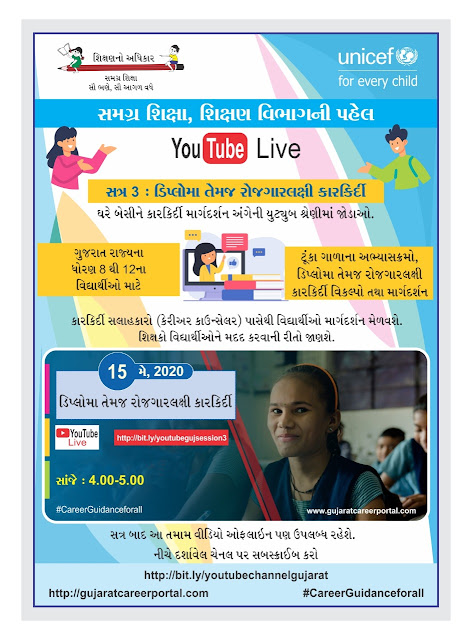This semester will help students learn about short-term, diploma, and vocational courses. Students will be made aware of Polytechnic, ITI, and related courses in the state.
 |
| Samagra Shiksha Gujarat is organizing YouTube live classes on 08-10 class students and career guidance |
1. Course
Before applying you should do thorough research including your potential course requirements, timelines, and course costs. Information on all courses available for review at Cambridge University is in the course directory. Also, make sure that you are the only one who meets the admission requirements for the course you want to review.
2. Deadline
There are two deadlines that you will simply consider: the end date of the instrument and therefore the end date of the fund. More decision>
3. Applicant Portal
You submit your application through the applicant portal. Once you have selected your course in the course directory, then click the Apply button to be directed to the applicant portal.
4. Educational. Educational References
We will need two academic references to support your application, and you submit referee details through the applicant portal. Your references will then automatically receive a reference request. Make sure they have their consent before you apply.
5. Colleges
All graduate students are members of the university. In your application for a review of Cambridge University, you will suggest two choices for a college lodge or choose to apply openly to the university to allocate you.
6. Apply
Once you have finished writing your application, after receiving all the necessary supporting documents and references, your application is ready to be submitted and you will be asked to pay the device fee.
7. Interview
Most departments/faculties will visit you if your application is accepted at a later stage of the admission process. Some scholarships and student scholarships will invite shortlisted candidates for interviews. Most interviews will be conducted by video conferencing or telephone.
if this video is not open then click on *Watch this video on YouTube*.
The University may be a confederation of faculties , Faculties, Departments and Colleges. the universities are governed by their own statutes and regulations, but are integral to the make-up of the University of Cambridge.
8. Colleges
Students live, eat and socialise in one among the University’s 31
autonomous Colleges. Undergraduates receive College supervisions – small
group teaching sessions – considered one among the simplest teaching
models within the world.
Each College has its own internal procedures. They select their own
students, subject to college regulations, and most admit both
undergraduate and postgraduate students. College representatives sit on
the University Council and committee .
9. Schools
There are six Schools, which each form an administrative grouping of
colleges and other institutions. They are: Arts and Humanities,
Biological Sciences, Clinical Medicine, Humanities and Social Sciences,
Physical Sciences, and Technology.
There is a Council of every School – including representatives of its
Faculties and Departments. the faculties are represented on the overall
Board.
Faculties and Departments
University Faculties organise teaching and research into individual
subjects or groups of subjects. Their work is generally organised into
sub-divisions called Departments.
Centres of studies are controlled by committees of management, bringing together representatives from several disciplines.



No comments:
Post a Comment